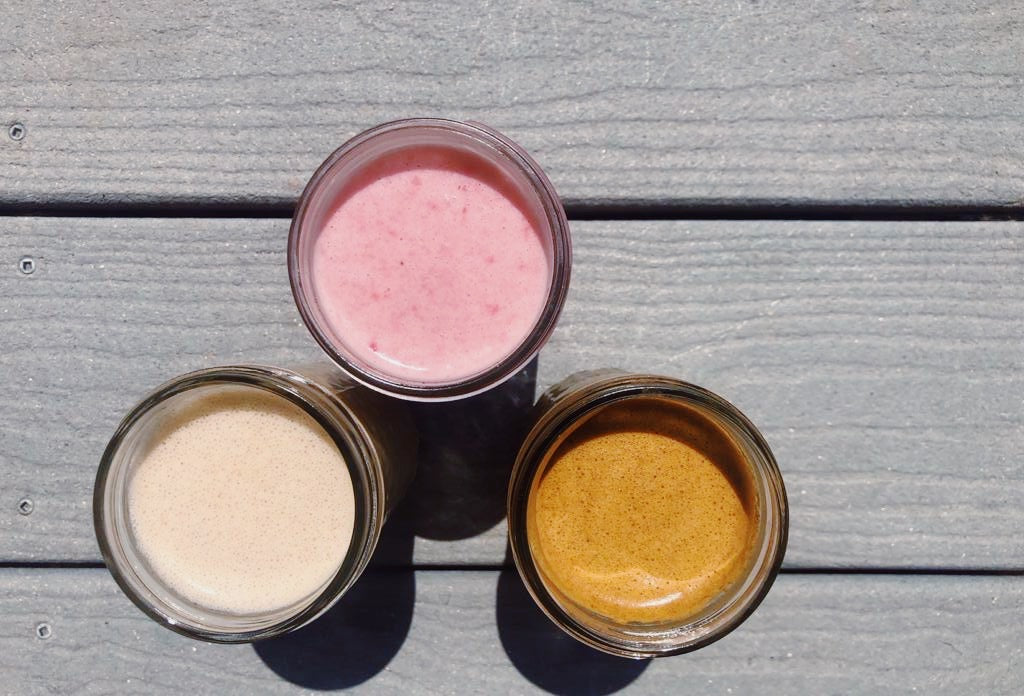
Ayurvedic Smoothies? Rest Assured, They Do Exist!
We live in a world that goes bananas over the latest trendy health beverages. From kombucha and turmeric ginger shots to the latest nut milk, cold-pressed juices and smoothies, we all love a new delicious drink that we can feel good about. Yet, do you ever wonder what Ayurveda, India’s traditional medical system, has to say about these exciting and readily available beverages? If you do, you are not alone!
Let’s begin this journey into the Ayurvedic perspective on healthy beverages by taking a look at smoothies - a summer favorite that we all know and love. Our answer to this frequently asked question is that like all things in Ayurveda, it depends on the person and their unique blend of the doshas. We know that this is an inconclusive and mildly frustrating answer, so let’s take a deeper look into what exactly makes a smoothie Ayurvedic or not.
Before you blend up your next smoothie or when trying to decide which delicious option to order from a menu, you may want to ask yourself a few questions:
- What is the current state of my agni?
- Is it the right season for smoothies?
- Am I following proper food combining according to Ayurveda?
The answers to these 3 questions will help you to choose a smoothie that is best suited for your unique and current needs.
Assess the State of Your Agni
Agni is the Sanskrit word for your digestive fire. One needs a balanced and strong agni to digest foods optimally, especially things like raw foods, juices and smoothies. When optimal digestion takes place, the tissues of your body receive the nutrients they need and no ama or toxic residue is left behind in the digestive tract.
It is important to note that if you are experiencing variable or low agni, we do not recommend drinking smoothies. Yet, if your agni is balanced and strong, Ayurvedic smoothies should be easily digested with no adverse effects such as bloating, gas or indigestion occurring.
A Seasonal Approach
According to Ayurveda, the best seasons to enjoy raw foods is during the spring and summer. During the spring, we are typically working to lighten the heavy and congested qualities associated with kapha dosha; hence, bitter greens and warming spices (which can be incorporated into smoothies) are suitable during this time of year. In the summer, pitta dosha is at its strongest and, generally speaking, this means that our agnis are best able to digest uncooked foods. Also, our body benefits from the cooling & hydrating actions of seasonal fruits like peaches, strawberries and watermelons which can be incorporated into smoothies. Fall and winter, also known as vata season, are when raw foods like salads, juices and smoothies are contraindicated in Ayurveda. These types of foods are in direct contrast to what our body needs to help keep us warm, heavy and nourished during this time of year.
Proper Food Combining
It is essential to keep the below Ayurvedic principles in mind when whipping together your next smoothies:
Be aware of your food combinations.
Ayurveda believes that one should not combine fresh, raw fruit with any other types of food because fruit is digested at a more rapid rate and as the other foods are more slowly broken down, the fruits are then forced to sit in the digestive tract. This can cause digestive upset as the fruit ferments and may lead to the accumulation of ama. This being said, we all of course love to combine fruit into our smoothies; therefore, we recommend using coconut milk rather than cow’s milk and other non-dairy milk alternatives since coconut is a fruit itself.
A note on cow’s milk...cow’s milk is considered a stand-alone food in Ayurveda, similar to fruit; hence, if coconut milk is unavailable or you want to try another milk substitute, we suggest using non-dairy milk alternatives for making your smoothies in order to keep your gut and Ayurveda happy! As a general rule of thumb, coconut milk can work well for all doshas depending on what you combine it with. Non-dairy milk alternatives Ayurveda recommends for each dosha are:
- vata: almond and oat milk
- pitta: coconut milk
- kapha: rice or soy milk
Say no to cold smoothies.
Say goodbye to ice cubes. We promise, after a while, you will NOT miss your smoothies being ice cold. In general, Ayurveda encourages us to avoid cold drinks because of their detrimental effects on agni. Cold beverages have the ability to weaken your digestive fire and this can lead to an accumulation of ama. This being said, instead of making your smoothies cold and frosty, opt to enjoy them at room temperature or even a little on the warm side. This simple change can help you digest your beloved smoothies more readily and with ease.
Say hello to fresh fruits & veggies.
As previously mentioned, Ayurveda is not a fan of cold beverages of any kind; thus, it is time to say goodbye to frozen fruits (and veggies) as well! These frozen foods should be omitted when concocting your smoothies because they are far too cold and will upset your digestion. Also, frozen foods lack the prana-rich nutrients contained within fresh seasonal fruits and vegetables.
Incorporate spices.
Did you know that simple culinary herbs like ginger, cinnamon, cardamom and mint not only make your food taste delicious but are also considered dipanas, or digestive herbs? Dipanas help our bodies digest foods properly and can ease digestive upset such as flatulence, bloating and/or hyperacidity. Therefore, when you incorporate spices appropriate for your dosha into your meals and/or smoothies, your body will thank you for the extra assistance in the digestion and assimilation of nutrients.
Keep it simple.
To have a truly Ayurvedic smoothie take a less is more approach. This means that you will not want to have a myriad of ingredients like a mix of protein powder, collagen, nut butters, fruits and vegetables combined together as you would in other smoothie recipes. This simple approach honors the proper food combining principles outlined in Ayurveda and this, in turn, ensures that your body is extracting all the valuable vitamins, minerals and nutrients contained within these simple yet prana-rich smoothies.
Ayurvedic Smoothie Recipes for Each Dosha
Unsure which smoothie is right for you? Take our Discover Your Dosha Quiz!
Replenish Your Vata Smoothie
Ingredients:
- 2 cups oat milk, unsweetened
- 1 tsp. almond butter
- ½ tsp. Ashwagandha powder
- ½ tsp. Shatavari powder
- ½ tsp. chia seeds
- ½ tsp. cinnamon powder
Directions:
Combine all ingredients into a blender and blend until smooth.
Soothe Your Pitta Smoothie
Ingredients:
- prepare 1 cup of Cool & Calm Blend Tea, set aside
- 1 can coconut milk, use coconut cream only and disregard the remaining coconut water (or save for making another dish like your favorite veggie curry)
- ½ cup fresh strawberries (fresh peaches or mixed berries works well too!)
- 1 tsp. Shatavari powder
- ½ tsp. cardamom powder
Directions:
Combine all ingredients into a blender and blend until smooth.
Uplift Your Kapha Smoothie
Ingredients:
- 2 cups rice milk, unsweetened
- 2 tsp. cacao powder
- 2 tsp. Golden Milk powder
- 1 handful of fresh spinach (optional)
Directions:
Combine all ingredients into a blender and blend until smooth.
Since we are officially into some of the hottest days of the year in the Northern Hemisphere, now would be a wonderful time to experiment with applying the above Ayurvedic principles into your smoothie recipes. As you incorporate these principles, observe the results. What works for you and your body? What does not? Allow Ayurveda to open the doors of curiosity and give yourself the time to learn more about YOU AND YOUR INDIVIDUAL NEEDS.
Please share with us and the Ayurvedic Lifestyle community any questions or Ayurvedic smoothie ideas you may have in the comments section directly below. We always love hearing from you!
Stay tuned for our next blog post offering creative ways to use your Aromatherapy Spritzers!








Leave a comment
This site is protected by hCaptcha and the hCaptcha Privacy Policy and Terms of Service apply.